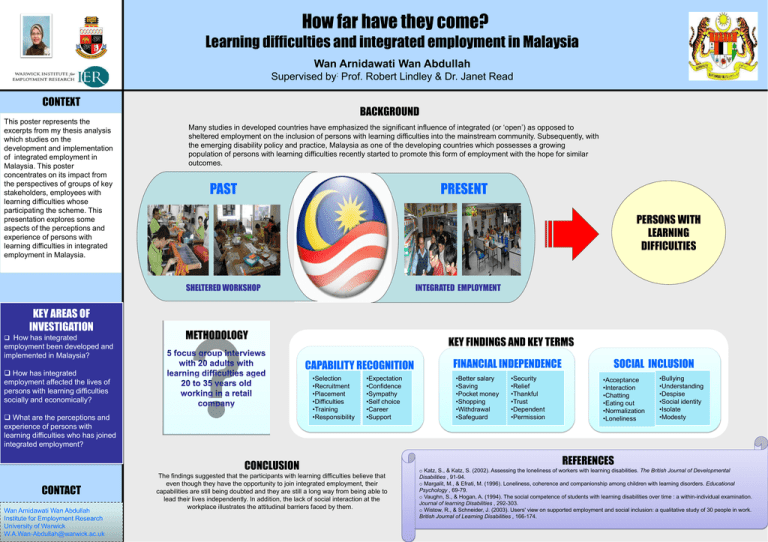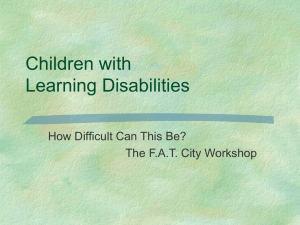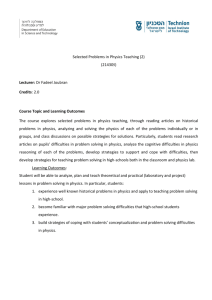How far have they come? Wan Arnidawati Wan Abdullah CONTEXT
advertisement

How far have they come? Learning difficulties and integrated employment in Malaysia Wan Arnidawati Wan Abdullah Supervised by: Prof. Robert Lindley & Dr. Janet Read CONTEXT BACKGROUND This poster represents the excerpts from my thesis analysis which studies on the development and implementation of integrated employment in Malaysia. This poster concentrates on its impact from the perspectives of groups of key stakeholders, employees with learning difficulties whose participating the scheme. This presentation explores some aspects of the perceptions and experience of persons with learning difficulties in integrated employment in Malaysia. Many studies in developed countries have emphasized the significant influence of integrated (or ‘open’) as opposed to sheltered employment on the inclusion of persons with learning difficulties into the mainstream community. Subsequently, with the emerging disability policy and practice, Malaysia as one of the developing countries which possesses a growing population of persons with learning difficulties recently started to promote this form of employment with the hope for similar outcomes. PAST PRESENT PERSONS WITH LEARNING DIFFICULTIES SHELTERED WORKSHOP KEY AREAS OF INVESTIGATION How has integrated INTEGRATED EMPLOYMENT METHODOLOGY employment been developed and implemented in Malaysia? KEY FINDINGS AND KEY TERMS CAPABILITY RECOGNITION How has integrated employment affected the lives of persons with learning difficulties socially and economically? •Selection •Recruitment •Placement •Difficulties •Training •Responsibility What are the perceptions and experience of persons with learning difficulties who has joined integrated employment? •Expectation •Confidence •Sympathy •Self choice •Career •Support CONCLUSION CONTACT Wan Arnidawati Wan Abdullah Institute for Employment Research University of Warwick Poster Design & Printing by Genigraphics W.A.Wan-Abdullah@warwick.ac.uk 800.790.4001 ® The findings suggested that the participants with learning difficulties believe that even though they have the opportunity to join integrated employment, their capabilities are still being doubted and they are still a long way from being able to lead their lives independently. In addition, the lack of social interaction at the workplace illustrates the attitudinal barriers faced by them. FINANCIAL INDEPENDENCE •Better salary •Saving •Pocket money •Shopping •Withdrawal •Safeguard •Security •Relief •Thankful •Trust •Dependent •Permission SOCIAL INCLUSION •Acceptance •Interaction •Chatting •Eating out •Normalization •Loneliness •Bullying •Understanding •Despise •Social identity •Isolate •Modesty REFERENCES o Katz, S., & Katz, S. (2002). Assessing the loneliness of workers with learning disabilities. The British Journal of Developmental Disabilities , 91-94. o Margalit, M., & Efrati, M. (1996). Loneliness, coherence and companionship among children with learning disorders. Educational Psychology , 69-79. o Vaughn, S., & Hogan, A. (1994). The social competence of students with learning disabilities over time : a within-individual examination. Journal of learning Disabilities , 292-303. o Wistow, R., & Schneider, J. (2003). Users' view on supported employment and social inclusion: a qualitative study of 30 people in work. British Journal of Learning Disabilities , 166-174.




